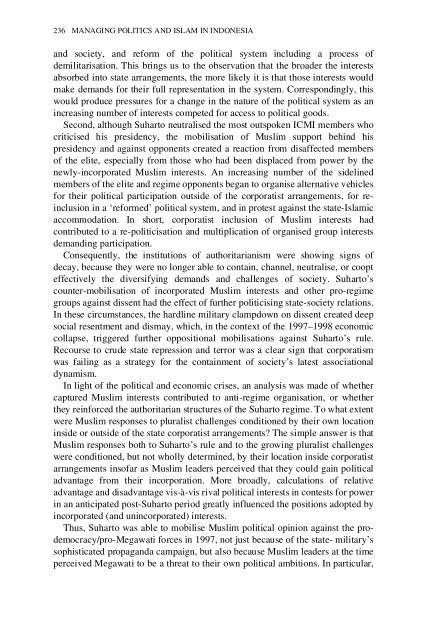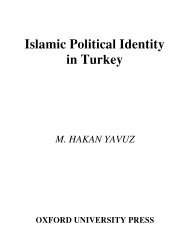Create successful ePaper yourself
Turn your PDF publications into a flip-book with our unique Google optimized e-Paper software.
236 MANAGING POLITICS AND ISLAM IN INDONESIA<strong>and</strong> society, <strong>and</strong> reform of the political system <strong>in</strong>clud<strong>in</strong>g a process ofdemilitarisation. This br<strong>in</strong>gs us to the observation that the broader the <strong>in</strong>terestsabsorbed <strong>in</strong>to state arrangements, the more likely it is that those <strong>in</strong>terests wouldmake dem<strong>and</strong>s for their full representation <strong>in</strong> the system. Correspond<strong>in</strong>gly, thiswould produce pressures for a change <strong>in</strong> the nature of the political system as an<strong>in</strong>creas<strong>in</strong>g number of <strong>in</strong>terests competed for access to political goods.Second, although Suharto neutralised the most outspoken ICMI members whocriticised his presidency, the mobilisation of Muslim support beh<strong>in</strong>d hispresidency <strong>and</strong> aga<strong>in</strong>st opponents created a reaction from disaffected membersof the elite, especially from those who had been displaced from power by thenewly-<strong>in</strong>corporated Muslim <strong>in</strong>terests. An <strong>in</strong>creas<strong>in</strong>g number of the sidel<strong>in</strong>edmembers of the elite <strong>and</strong> regime opponents began to organise alternative vehiclesfor their political participation outside of the corporatist arrangements, for re<strong>in</strong>clusion<strong>in</strong> a ‘reformed’ political system, <strong>and</strong> <strong>in</strong> protest aga<strong>in</strong>st the state-<strong>Islam</strong>icaccommodation. In short, corporatist <strong>in</strong>clusion of Muslim <strong>in</strong>terests hadcontributed to a re-politicisation <strong>and</strong> multiplication of organised group <strong>in</strong>terestsdem<strong>and</strong><strong>in</strong>g participation.Consequently, the <strong>in</strong>stitutions of authoritarianism were show<strong>in</strong>g signs ofdecay, because they were no longer able to conta<strong>in</strong>, channel, neutralise, or coopteffectively the diversify<strong>in</strong>g dem<strong>and</strong>s <strong>and</strong> challenges of society. Suharto’scounter-mobilisation of <strong>in</strong>corporated Muslim <strong>in</strong>terests <strong>and</strong> other pro-regimegroups aga<strong>in</strong>st dissent had the effect of further politicis<strong>in</strong>g state-society relations.In these circumstances, the hardl<strong>in</strong>e military clampdown on dissent created deepsocial resentment <strong>and</strong> dismay, which, <strong>in</strong> the context of the 1997–1998 economiccollapse, triggered further oppositional mobilisations aga<strong>in</strong>st Suharto’s rule.Recourse to crude state repression <strong>and</strong> terror was a clear sign that corporatismwas fail<strong>in</strong>g as a strategy for the conta<strong>in</strong>ment of society’s latest associationaldynamism.In light of the political <strong>and</strong> economic crises, an analysis was made of whethercaptured Muslim <strong>in</strong>terests contributed to anti-regime organisation, or whetherthey re<strong>in</strong>forced the authoritarian structures of the Suharto regime. To what extentwere Muslim responses to pluralist challenges conditioned by their own location<strong>in</strong>side or outside of the state corporatist arrangements? The simple answer is thatMuslim responses both to Suharto’s rule <strong>and</strong> to the grow<strong>in</strong>g pluralist challengeswere conditioned, but not wholly determ<strong>in</strong>ed, by their location <strong>in</strong>side corporatistarrangements <strong>in</strong>sofar as Muslim leaders perceived that they could ga<strong>in</strong> politicaladvantage from their <strong>in</strong>corporation. More broadly, calculations of relativeadvantage <strong>and</strong> disadvantage vis-à-vis rival political <strong>in</strong>terests <strong>in</strong> contests for power<strong>in</strong> an anticipated post-Suharto period greatly <strong>in</strong>fluenced the positions adopted by<strong>in</strong>corporated (<strong>and</strong> un<strong>in</strong>corporated) <strong>in</strong>terests.Thus, Suharto was able to mobilise Muslim political op<strong>in</strong>ion aga<strong>in</strong>st the prodemocracy/pro-Megawatiforces <strong>in</strong> 1997, not just because of the state- military’ssophisticated propag<strong>and</strong>a campaign, but also because Muslim leaders at the timeperceived Megawati to be a threat to their own political ambitions. In particular,




